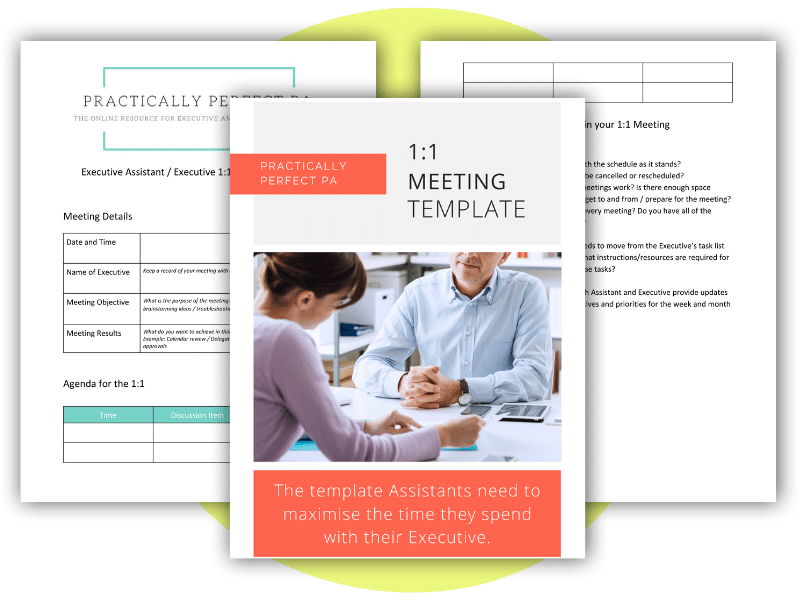Anticipating needs and other mind reading tricks
Over the last few years, I have written extensively about creating a successful Executive and EA partnership. It is the critical relationship for Assistants and the one part of the role you must get right. Without a successful collaboration, the work becomes that much more challenging. So, today I want to talk about anticipating needs and other mind-reading tricks.
If something is causing your Executive stress or is an unnecessary waste of their time, you should do everything you can to fix it for them. A good solid working relationship between you and your Executive is achievable if your manager doesn’t feel they have to manage you. Don’t get me wrong; they must be good managers who support them professionally through regular catch-up meetings and feedback. But on a daily basis, you should anticipate their needs and ensure everything is running smoothly around them. Not only will that improve the relationship with your boss, but it will also make you one hell of an assistant!
So how do you go about anticipating needs and other mind-reading tricks? How do you ensure you are always one step ahead of your Executive? I think it boils down to being proactive rather than reactive. For Assistants, this cannot be easy to achieve. We work in constant flux, and often we spend the day putting out fires and reacting to other people’s wants and urgent requests. I get that.
But, for Assistants, being proactive rather than reactive is such a vital skill, and it really will lead you to thrive in the role. Why? Because you are not just doing the work people ask you to do, you create your role, working on your projects and adding value where you see it. This is a much better position to be in as an Assistant, leading to more opportunities, and it will help you make your Executive more successful.
Proactive vs Reactive
So let’s look at the three areas that will help you move from a reactive Assistant to a proactive Assistant.
- Increasing your business awareness
- Taking responsibility for your role
- Forward-thinking
In the past, I have spoken a lot about business acumen. For me, this is such an important topic for Assistants. If you have zero interest in what your Executive does, you will never thrive in the Assistant role. You have to care about them and the business.
Sure, this is easier said than done. Suppose you work in an industry that isn’t glamorous or an area you are not excited about. In that case, you will not be overwhelmed with joy whenever you open a briefing document but say that to thrive in an assistant’s role. You do have to be interested and knowledgeable about the industry. You have to care about your Executive and what they want to achieve. Without this, you will just be surviving and never learn to anticipate their needs or move from proactive to reactive.
If you need to improve your business acumen, I have a great checklist you can work through to help you improve in this area.
Start with the why
Okay, I’ve taken this from the book by Simon Sinek. He has done a brilliant Ted talk that you should all watch, by the way. In his book, he talks about the idea of starting with why – and that is where I want you to start. Why does your organisation do what it does? Not what it does or how it does it, but why? What is the purpose of your organisation? And then within that – why does your Executive or Executives do what they do? What are their core beliefs and values? Why do they work a certain way, and what makes them tick? Once you start to think about the why of things, you will start to understand the bigger picture – in other words, why something has to be done rather than just getting on and doing it.
Never stop learning
Attend training in areas you can improve – business strategy, finance, marketing, whatever it is. Where can you add value? Where is there a gap in expertise – can you fill that gap?
Never stop networking
Networking is basically the foundation of good overall business acumen and understanding the direction of the business.
Networking for Assistants is essential for many reasons, but it will greatly improve your knowledge in terms of business acumen. And here is why. When you network, you find out about stuff! So go to networking events (which are often free or for a small fee), meet with other PAs, attend the training sessions that accompany networking events, and meet with suppliers. Go to team drinks, departmental drinks, and your organisation’s networking events and talk to people! One of the cheapest ways to learn about the organisation is to talk to people and ask what they do! Anticipating needs and other mind-reading tricks doesn’t have to be complicated.
As an Assistant, you are automatically given a level of trust that other people within the organisation do not take advantage of that. Always ask, ‘what is happening with you?’ People want to get on well with PAs. They know that PAs are worth knowing and have a lot of information, so you use this to your advantage to build your knowledge of the company and what is happening. As I said before, be curious!
Read everything
This might seem obvious to some of you, but I’ve met Assistants who don’t do this, and it is this… READ everything!
And I mean everything!
Read your Executive’s emails – both their inbox and sent items. Read their reports, memos, files, past emails – everything! Business magazine that your Executive subscribes to. Make sure you read everything put up on your internal communication systems – intranet, collaborative tools such as Slack or Trello and briefing documents. I always found the intranet a weird and wonderful place to get information about the organisation.
Listen to everything
Because this is how you really find out how your Executive operates and the people they surround themselves with.
Do you take minutes at meetings? Again this is another fantastic way to increase your business awareness. Always offer to go into meetings to take notes, you will pick up so much of what is going on, and you can anticipate what your Executive will need coming out of that meeting. Listen to what is going on around you, and what your colleagues are talking about over lunch or during post-work drinks.
You don’t need to divulge this information to anyone, but being business savvy isn’t just about the nuts and bolts of the business. It is also about the mood and feel of the office. People make businesses, so make sure you also understand what is happening with your colleagues and the organisation’s culture.
Attend meetings
Do you attend meetings with your manager? If you don’t, you need to. You must be privy to the same information as your manager. Okay, there will be times that you don’t attend meetings – 1.2.1s with other staff members, but you should be attending client meetings, board meetings, team meetings and project meetings. Everything that involves your Executive making a decision, noting information.
Attending meetings will bring you into contact with the company’s decision-makers, and you will be privy to their conversations and how they come to make decisions. Ensure you listen to these people. If you know why decisions are made in the company, you can start making choices about your everyday work following the same strategy as the executive team.
Your Assistant works WITH you, not FOR you.
Hallie reads all of my emails, attends the majority of my classes & trainings, listens on calls, and sits in on meetings.
She is more effective when she knows what I know, knows how I think, how I solve problems, and what I have decided and promised (so she can follow-up and deliver).
Do not keep your assistant on the periphery, assigning tasks that have no context or meaning.
They will be far more invested in your success when they are a part of the entire process, and eventually part of the decision making or even making decisions on your behalf. When you bring your assistant into your inner circle – everyone wins.
Adam Hergenrother
This is my final point on business acumen, which you need to share with your Executive. As a lot of you will know, we have been fortunate to have Hallie and Adam on the Practically Perfect PA Virtual Summits before. This is my favourite quote and what happens when your Executive lets you do your job! Anticipating needs and other mind reading tricks becomes much simpler.
You both succeed!
Taking responsibility for your role
I have broken this down into three areas:
- Taking action and making decisions
- Being accountable and what I like to call
- random acts of initiative
So this is what I like to call the section on ‘don’t wait to be asked to do things.’ The next step is anticipating needs and other mind-reading tricks!
Have a look at all of the day-to-day tasks that are assigned to you. I bet there are loads. These are the tasks that you should have complete control over.
They may be minor things like picking up the post every morning to more significant tasks like managing your Executive’s schedule. For every task you have complete control over, think to yourself: How can I make every task successful? What can I do to ensure the process attached to each task runs smoothly and is working well? Make a list of these tasks and spend time making them more efficient.
You are accountable for these tasks and should take responsibility for their success.
The most important aspect of the Assistant role is saving our Executive time. It is their most valuable resource, and everything we do should be geared toward protecting and nurturing their time. In this post, I want to share some advice I gave a few years ago about some areas where we can save our Executive’s time – by doing the work ourselves. These are the tasks that you should be doing instead of your Executive.
They are the tasks that take time but don’t necessarily drive your Executive’s objectives forward. There will be loads of other functions that your Executive will be working on that they shouldn’t be – or that you can do confidently, and you should bring these different tasks to your Executive’s attention. As I say, the more you can take off their plate, the better! Here are just a few pointers!
These are the tasks you should be doing instead of your Executive.
-
Communications
Assistants should draft all communications to staff, including notes for meetings, updates or news. Suppose the note is essential or high-level information. In that case, assistants should prepare the communication for their Executive, asking them to review or amend the details before they send the communication out on behalf of their Executive. Assistants should also deal with all inbound communications, organise and decide which information to give their Executive.
-
Research
Assistants should research on behalf of their manager. This could be anything from finding out details on a new client and their business to checking other organisations’ annual returns or viewing a further business contact LinkedIn profile. This saves the executives time researching and better prepares them for meeting new individuals.
-
Administration of documents
Assistants should manage the administration of records on behalf of their manager. Deciding which documents their Executive should read (assistants should schedule time in the Executive’s diary for catching up on paperwork/reading etc.), forwarding documents to other staff members as appropriate or filing information for a later date.
Assistants should also ensure that all confidential materials are securely locked away or shredded. All documents sent to the Executive should first go to the Assistant to print or format them for the Executive to read in the scheduled time. The same applies to board papers and board-level reports.
-
Email and diary management
Assistants should manage all of their Executive’s emails. They should be able to reply to incoming emails and send out emails on behalf of their manager. The Executive’s calendar should be controlled entirely by their Assistant, and the Executive shouldn’t edit the schedule at all (in an ideal world!)
Instead, they should direct all meeting requests to their Assistant. The Executive should be kept in the loop when changes are made to the diary, and this should be discussed during the assistant/executive daily catch-up meeting.
-
Business travel
Executives should not organise their business travel, no matter how easy or quick they think it is! Assistants should manage all aspects of their Executive’s business travel, including domestic and international trips. Updates and travel plans should be discussed with the Executive during the daily catch-up meeting.
-
Purchase orders, invoices and expenses
Assistants should control all financial aspects of their Executive’s office, including purchase orders and invoices. Assistants should also manage the expenses process for their manager – organising receipts, completing paperwork etc. Ideally, assistants should have the authority to sign off invoices and expenses (for other staff members) on behalf of their manager. If this is not an option, assistants should schedule time in their manager’s diary for signing documents.
-
Holiday and sickness records
If the Executive runs a department, the Assistant should manage all their holiday and sickness records with authority to sign off standard holiday requests and short-term sick leave. The Executive should only be informed if the time off work is longer than usual or someone is frequently out of the office.
-
Administrative systems
Assistants should have complete control over all administrative systems and day-to-day office management. Such tasks include: maintaining office equipment, placing stationery orders, managing office furniture, booking and maintaining meeting rooms etc. Executives should not have to worry about the administration. The Assistant should ensure this all runs smoothly.
-
Suppliers
Assistants should control the management of companies directly supplying their Executive and department, including researching new suppliers and maintaining contracts, communications and invoices.
-
Point of contact
Assistants should be the point of contact for all things relating to their manager. To save the executive time in their day to concentrate on the bigger picture, assistants should filter all communications, meeting requests, administration and finance-related matters.
How can you be more accountable at work?
This is a big question! What do I mean by being more accountable, and why is it important for Assistants? For me, being accountable means taking control of your success and managing your workload, career and relationship with your Executive and colleagues. It means making decisions and taking ownership of the results.
We need to be accountable for our work, but for some reason, this is something that we struggle with.
I think it harks back to the age-old problem that we see ourselves as ‘just the assistant’ and don’t have the authority to question things and make decisions. We are given work to complete rather than put forward our suggestions. The term’ support staff’ doesn’t help either because it suggests that we are there only to offer support, do the things asked of us and not much more.
This, my friends, is a load of rubbish! The role is changing, there are more opportunities for Assistants than ever, and we must be accountable for our success. That makes it much easier to start anticipating needs and other mind-reading tricks!
What are the benefits of accountability?
The benefits are huge when you take control of your workload, accept accountability for your actions, and take real responsibility for your tasks. Here are just a few differences you will find in your behaviour once you start to think about accountability within your role:
- You will set yourself goals.
- You will recognise that you are the expert at what you do.
- You will recognise the power that you hold within your organisation.
So, accountability – it’s a good thing, right?! Yup, I’m probably talking to the converted here. But the question is. Where do you start? Let’s have a look at how assistants can specifically be more accountable within the role:
What tasks do you have control over?
This is the first step to being more accountable. Have a look at all of the day-to-day tasks that are assigned to you. I bet there are loads. These are the tasks that you should have complete control over. They may be minor things like picking up the post every morning and larger tasks like managing your Executive’s schedule. For every task you have complete control over, think to yourself: How can I make every task successful? What can I do to ensure the process attached to each task runs smoothly and is working well? Make a list of these tasks and spend time making them more efficient. You are accountable for these tasks and should take responsibility for their success.
Be results-focused
Being more accountable for your actions will make you more results-focused and more valuable to your organisation. With everything you do, think to yourself, what are the goals here? What are my objectives, what do I want to achieve, and what are the useful outcomes? This level of critical thinking benefits your business because you constantly look for a return on investment in everything you do. If you spend ages on a task that is not business-critical or adds value, you can adjust the process and make it more effective because you are accountable for that task.
What areas can you influence?
What areas can you influence? You may not have direct responsibility for a whole load of tasks, but you do influence them. Again, if it helps, make a list. A task that springs to mind is working with suppliers. You are not the person who necessarily signs the contracts for new suppliers, but you probably use them more than most, so again, take some responsibility for this relationship. Let your Executive know if a supplier isn’t quite working. If they are great, let other people in your organisation know so they can benefit too.
Be honest about what you are doing and where you are with tasks.
Being accountable for your work doesn’t just mean you control the good stuff; it also means you are honest when things aren’t quite working. If you decide to take more ownership of your work, you’ll have to put your hand up when you might fall behind deadlines or struggle with something. This isn’t necessarily a bad thing. If you are working on projects that push and challenge you, there will be times you need to seek advice from your Executive (just like any other staff member).
Remember, you have to be accountable for all of your work.
I remember one time I was working on a brilliant company-wide project. I was excited about it and spent a lot of time on the details. My Executive called me into her office one afternoon for a quick catch-up. She told me that she was proud that I was working on this big project but had noticed that I wasn’t quite up to speed with my daily tasks, and I’d missed a few things I had always done for her. She was right. I was having a great time working on this new task, but I had to consider all the other stuff I had to do. I let the ball drop, but being accountable meant I had to put my hands up, apologise and say it wouldn’t happen again. Being accountable for your mistake sucks, but it is as important as being accountable for your successes!
What training do you need to be in total control of your work?
Another aspect of being accountable and in control of your work is the realisation that you might need help to make each task successful. This is why you must ask for training; your organisation takes your request seriously. When you are accountable, you know that other people within your organisation depend on the results of your work, so without training, how can you perform to the best of your abilities?
Last but not least.
Accountability has to begin with you. It is an important competency for Assistants, and it will only become more valued as our industry moves from a support role into a business-critical one. Strategic Assistants are good at anticipating needs and other mind-reading tricks.
The initiative is doing the right things without being told and getting involved in the business. We’ve discussed how you do this, but I thought I would share a few examples of what I like to call random acts of initiative. These are some of the actions you can take to show initiative as an Assistant.
- Seeking more responsibilities
- Tackling challenges
- Sharing knowledge
- Helping your coworkers
- Providing regular status updates
- Building strong working relationships with coworkers
- Doing things and projects that others avoid
- Volunteering to work with different teams and departments
- Stepping in when someone is unavailable or absent
- Offering to mentor others
- Asking for training
- Referring to good potential employees
- Brainstorming improvement ideas
- Helping others to see their strengths and qualities
- Anticipating and preventing problems
- Maintaining high-quality standards
- Making good decisions and being decisive
- Being innovative: improving systems, processes and procedures
Forward-thinking Assistants
Being a forward-thinking Assistant will help you much in the role and help you anticipate needs and other mind-reading tricks. But I’m going, to be honest. It isn’t easy – here is why. We are so busy getting through our tasks, supporting others and helping out with as much as possible it can be hard to take a breath and think through how everything is working and what problems might occur shortly. But this is what Assistants who are forward-thinkers can achieve in the role.
- You are never caught off guard – Because you understand the behaviour of those around you and the business structure.
- You plan for the future – Because you take the time to plan, think and strategize about future challenges.
- You take action – Because you don’t wait for others to make decisions. You meet problems face-on and get them fixed.
- You are fully integrated into your business – Because you move at the same pace as your business, you can adapt and react when necessary.
These are the qualities and traits of an Assistant who anticipates needs and has a ton of mind-reading tricks up their sleeve.
Anticipation, understanding, active listening and communication remain the keys to a successful partnership with your Executive. To further explore this topic, you can look at our Advanced Assistant Online Course. The course aims to take your career to the next level by teaching the skills and competencies needed to thrive in the role.





